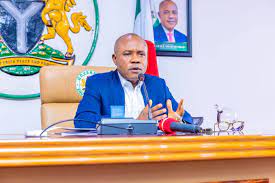Caucus of Peoples Democratic Party (PDP) in the House of Representatives, has stated that the federal government had remained inconsistent in its economic programmes, leading to the current bad state of the nation.
The caucus has therefore, called on President Muhammadu Buhari to as a matter of urgency, reverse the recent hike in pump price of petrol and electricity tariff, to address yearnings of Nigerians and the economic realities of the moment.
Dropping the position on Sunday, leader of the caucus, Hon. Kingsley Chinda explained that the resolution was arrived at during its 18th virtual meeting, where it reviewed issues of national interest particularly, the recent cost increases by the government, including the increase in pump price of fuel and electricity
Others include Stamp duties, telecommunication charges and Implementation of 7.5 Value Added Tax (VAT). “The COVID-19 pandemic has no doubt inflicted great hardship globally and have seen most economies fluttering.
“Most, if not all responsive governments have devised innovative people-oriented interventions and opening new frontiers to reducing tax burdens on their citizens to stimulate their economies and cushion the unfortunate effect of the pandemic.
“Conversely, the Nigerian government led by President Muhammadu Buhari has found this inauspicious time to implement what can only be described as strangle-hold economic policies on the lives of perceived helpless Nigerian citizens.
“More disturbing is the fact that the review in electricity tariffs and fuel prices is not commensurate with an increase in salary or income of the people”, it stated.
Chinda lamented further that “from an inherited pump price of N85 per litre, they have systematically increased it to an exorbitant, strangulating cost of N162 per litre. All these have been achieved without consultation or engagement with the Nigerian people, at whose pleasure he (the president) serves”, pointing out several perceived inconsistencies in the economic policy drives of the current government.




